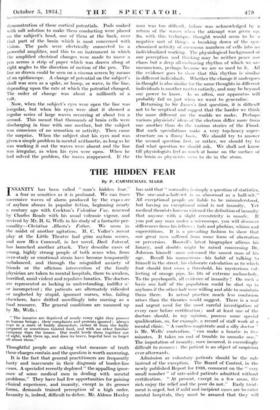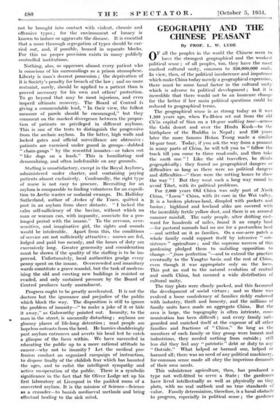THE HIDDEN FEAR
By P. CARMICHAEL MARR
iNSANITY has been called " man's hidden fear," 1 a fear as sensitive as it is profound. We can trace successive waves of alarm produced by the expcs ire of asylum abuses in popular fiction, beginning nearly a century ago with Cockton's Valentine Vox, renewed by Charles Reade with his usual volcanic vigour, and revived by Mr_ H. G. Wells in his study of a fantastic per- sonality—Christina Alberta's Father. We seem in the midst of another agitation. H. C. Voller's recent play at the Little Theatre had grim asylum scenes, and now Mks Cornwall, in her novel, Dark Interval, has launched another attack. They describe cases of young, highly strung people of both sexes who, from over-study or emotional strain have become temporarily unbalanced, and through the misguided anxiety of friends or the officious intervention of the family physician are taken to mental hospitals, there to awaken, horrified, amid violent and repulsive lunatics. The doctors are represented as lacking in understanding, indiffer it or incompetent ; the patients are alternately ridiculed or neglected by stupid, ignorant nurses, who, failing elsewhere, have drifted unwillingly into nursing as a final resource. The general conditions are summed up by Mr. Wells : " The inmates are deprived of nearly every right they possess as human beings ; their complaints and protests ignored ; always kept in a state of bodily discomfort, rather ill from the badly prepared or sometimes tainted food, and with no other familiar company than the insane. Our world herds them together out of sight, walls them up, and does its brave, hopeful best to forget all about them."
Thoughtful people are asking what measure of truth these charges contain and the question is worth answering.
It, is the fact that general practitioners are frequently hasty and inaccurate in their diagnosis of border-line cases. A specialist recently deplored " the appalling ignor- ance of some medical men in dealing with mental problems." They have had few opportunities for gaining clinical experience, and insanity, except in its grosser forms, demands trained perception of a high .order. Insanity is, indeed, difficult to define. Mr. Aldous Huxley has said that " normality is simply a question of statistics. The one-and-a-half-wit is as abnormal as a half-wit." All exceptional people are liable to be misunderstood, but having an exceptional mind is not insanity. Yet medical theorists have so widened the definition of insanity that anyone with a slight eccentricity is unsafe. If you put any man under a microscope, you will discover differences from his fellows : fads and phobias, whims and superstitions. It is a prevailing fashion to show that our great men suffered from some form of aberration or perversion. Boswell's latest biographer affirins his lunacy, and doubts might be raised concerning Dr. Johnson himself—once esteemed the sanest man of his age. Recall his mannerisms—his habit of talking to himself in the street, his elaborate calculation as to which foot should firSt cross a threshold, his mysterious col- lecting of orange pips, his fits of extreme melancholy. To the psychopath, all evidence of insanity ! On such a basis one half of the population could be shut up in asylums if the other half were willing and able to maintain them there. In actual practice much less confusion arises than the theories would suggest. There is a real and urgent need for the most careful investigation of every case before certification ; and at least one of the doctors should, in my opinion, possess sonic special qualification, as, for example, a record of staff work at a mental clinic. " A careless magistrate and a silly doctor " is Mr. Wells' contention, " can make a lunatic in five minutes. It takes no end of trouble to unmake one." The imputation of insanity, once incurred, is exceedingly difficult to remove : the patient is an object of suspicion ever afterwards.
Admission as voluntary patients should be the rule instead of the exception. The Board of Control, in the newly published Report for 1933, comment on the " very small number " of rate-aided patients admitted without certification. " At present, except in a few areas, the rich enjoy the relief and the poor do not." Early treat- ment is urged, but if mild and incipient cases are to enter mental hospitals, they must be assured that they will not be brought into contact with violent, chronic and offensive types ; for the environment of lunacy is known to induce or aggravate the disease. It is essential that a more thorough segregation of types should be car-' tied out, and, if possible, housed in separate blocks. For this no proper provision exists in many publicly controlled institutions.
Nothing, also, so oppresses almost every patient who is conscious of his surroundings as a prison atmosphere. Liberty is man's dearest possession ; the deprivation of it is Society's penalty for breach of the law ; and no more restraint, surely, should be Applied to a patient than is proved necessary for his own and others' protection. To go beyond that may be most injurious, and even imperil ultimate recovery. The Board of Control is giving a commendable lead, " In their View, the fullest measure of parole should be encouraged," but they comment on the marked divergence between the propor; tion of patients so privileged in different asylums. This is one of the tests to distinguish the progressive from the archaic asylum. In the latter, high walls and locked gates and official surveillance are obtrusive : patients are exercised under guard in groups—dubbed chain-gangs " by the resentful inmates—or taken out " like dogs on a leash." This is humiliating and demoralizing, and often indefensible on any grounds.
Staffing is unsatisfactory, except in the Royal Asylums-, administered under charter, and containing paying patients almost exclusively. Confessedly, the right type of nurse is not easy to procure. Recruiting for an asylum is comparable to finding volunteers for an expedi- tion to Arctic wastes or malarial swamps. Dr. Halliday Sutherland, author of Arches of the Years, quitted a post in an asylum from sheer distaste. " I lacked the calm self-sufficiency of the bovine, without which no man or woman can, with impunity, associate for a pro- longed period with the insane." To the nervous, over- sensitive, and imaginative girl, the sights and sounds would be intolerable. Apart from this, the conditions of service are not sufficiently attractive : nurses are fed, lodged and paid too meanly, and the hours of duty are excessively long. Greater generosity and consideration must be shown if the quality of the staffing is to be im, proved. Unfortunately, local authorities grudge every penny spent on the insane. Overcrowded and insanitary wards constitute a grave scandal, but the task of modern- izing the old and erecting new buildings is resisted or evaded, and only sustained pressure by the Board of Control produces tardy amendment.
Progress ought to be greatly accelerated. It is not the doctors but the ignorance and prejudice of the public which block the way. The disposition is still to ignore the problem of insanity—" to make a joke of it or hide it away," as Galsworthy pointed out. Insanity, to the • man in the street, is uncannily disturbing ; asylums are gloomy places of life-long detention ; mad people are hopeless outcasts from the herd. He hurries shudderingly past asylum entrances and averts his head lest he- catch a glimpse of the faces within. We have succeeded in educating the public up to a more rational attitude to cancer—why not to insanity ? Let the medical pro= fession conduct an organized campaign- of instruetion, to dispose finally of the childish fear which has haunted the ages, and to enlist the intelligent sympathy and -active co-operation of the public. There is a symbolia significance in the fact that Sir Oliver Lodge set up his 'first laboratory at Liverpool in the padded room of a -converted asylum. It is the -mission of Science—Science as a crusader—to banish mediaeval methods and bring effectual healing to the sick mind.











































 Previous page
Previous page